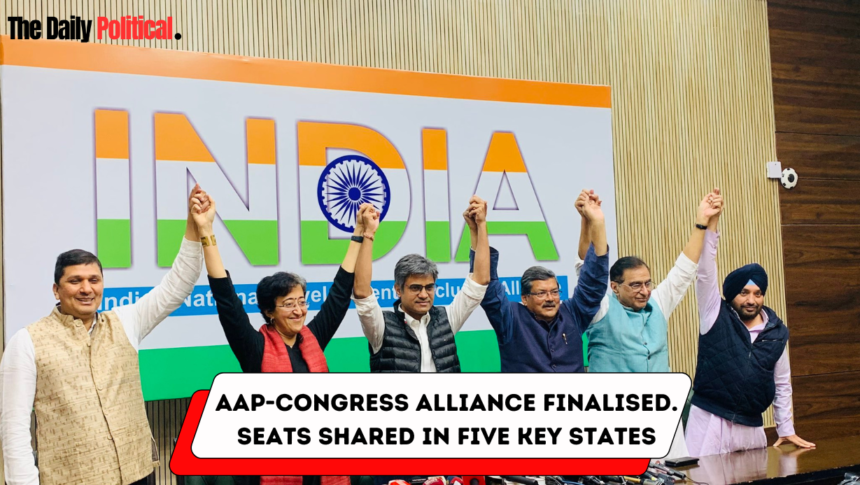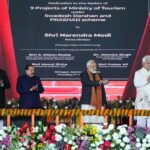New Delhi, February 24 : The upcoming Lok Sabha elections in India are set to witness a major political development with the announcement of an alliance between the Aam Aadmi Party (AAP) and the Indian National Congress (INC). This strategic move, aimed at consolidating anti-BJP votes and presenting a united front against the ruling party, has sent shockwaves through the political landscape. This report delves deeper into the details of the alliance, its potential impact, and the challenges it faces, incorporating quotes, expert opinions, and historical context.
AAP & Congress Senior Leaders addressing an Important Press Conference | LIVE https://t.co/uOi2A4844b
— AAP (@AamAadmiParty) February 24, 2024
The AAP-Congress alliance currently covers five key states: Delhi, Gujarat, Haryana, Goa, and Chandigarh. In Delhi, AAP takes the lead with four seats, while Congress gets three. This decision reflects AAP’s strong presence in the national capital, where it currently holds the Chief Minister’s office. AAP MP Sandeep Pathak stated, “This election will not be fought in the manner that Congress will contest from here and AAP will contest from there, INDIA will contest this election.” In Gujarat, Modi’s home state, Congress takes a dominant role with 24 seats, leaving AAP with two. This move aims to leverage Congress’s existing support base and potentially dent the BJP’s stronghold. Congress general secretary Mukul Wasnik remarked, “Gujarat has 26 Lok Sabha seats. Congress will contest on 24. AAP will have its candidates on 2 seats – Bharuch and Bhavnagar.” Haryana, another BJP bastion, sees an even split with nine seats for Congress and one for AAP. In Goa and Chandigarh, Congress takes full control, aiming to retain its hold in these smaller states.
While the AAP-Congress alliance presents a united front in these states, the exclusion of Punjab raises eyebrows. Despite the partnership elsewhere, AAP will contest all 13 Lok Sabha seats in its home state independently. This move highlights the complex political dynamics at play. AAP Chief Minister Arvind Kejriwal stated, “Keeping that in mind, casting aside our own political interests and keeping in mind the interest of the nation, we came together in this alliance.”
Challenges and Opportunities for AAP-Congress Alliance:
The alliance faces several challenges. Overcoming historical rivalries and building trust between party workers will be crucial. Additionally, ensuring a unified campaign message and avoiding clashes over local candidates will be critical. Furthermore, the BJP’s formidable election machinery and its strong hold in these states cannot be underestimated.
Expert Opinions about AAP-Congress Alliance :
Dr. Zoya Hasan, political analyst, commented, “The success of this alliance hinges on its ability to transcend past animosities and project a credible alternative to the BJP. Effective communication and joint campaigning will be key.” Professor Milan Vaishnav, another expert, stated, “The AAP-Congress alliance has the potential to disrupt the BJP’s dominance in some states, but internal contradictions and lack of a clear ideological vision could hinder its effectiveness.”
Historical Context of AAP-Congress Alliance:
The AAP-Congress relationship has been marked by both cooperation and competition. In Delhi, the two parties collaborated in the recent mayoral elections, defeating the BJP. However, in Punjab, they were fierce rivals, with AAP ultimately winning the state assembly elections in 2022. This complex history underscores the challenges of forging a strong, unified alliance.
National Impact of AAP-Congress Alliance :
The implications of this alliance extend beyond the five partnered states. It signifies a broader attempt by opposition parties to unite against the BJP. If successful, it could set the stage for a more competitive and unpredictable Lok Sabha election, with potential implications for the national political landscape.
The AAP-Congress alliance marks a significant development in Indian politics. While its potential impact is undeniable, the road ahead is not without challenges. The success of this alliance will depend on its ability to overcome internal differences, present a cohesive front, and effectively mobilize voters against the formidable BJP machinery. The upcoming Lok Sabha elections will be a crucial test for this newly formed alliance, and its outcome will have far-reaching consequences for the future of Indian politics.







